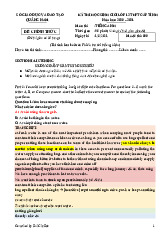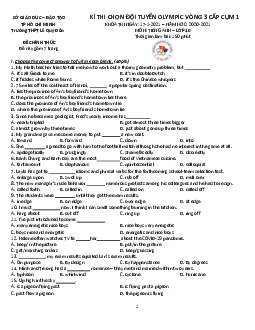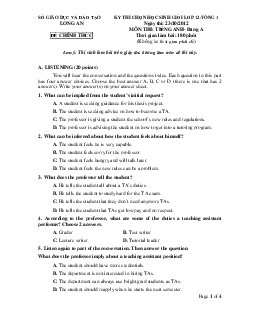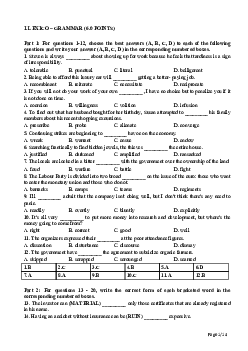






Preview text:
SỞ GD&ĐT VĨNH PHÚC
KỲ THI CHỌN HSG LỚP 12 THPT NĂM HỌC 2019-2020
ĐỀ THI MÔN: TIẾNG ANH THPT ĐỀ CHÍNH THỨC
(Dành cho học sinh THPT không chuyên)
(Đề thi gồm 07 trang)
Thời gian thi: 180 phút, không kể thời gian giao đề A. LISTENING Part 1: Question 1-10
Listen to part of a telephone conversation and complete the form below. Use no more than
THREE WORDS AND/OR A NUMBER in each space. Abbey Car Hire Booking form
Car size medium family car
Name: Steven 1._____________
Address: 3 Hamilton House, 2. _____________, Stretton
Postcode: ST175BU
Telephone: 3. _____________
Pick up: 4._____________ 25 April at 5. __________________
Drop off: 6. ______________________at 7.__________________
Total charge: £87.50 (including insurance)
Driving License: 8. ____________________
Extras 9. _____________________(£ 10)
Reference: 10. ____________________ Part 2: Question 1-5
You are going to hear a student being interviewed as part of a survey. For question 1-5. Choose
the correct letter A, B or C.
1. What is the students’ Union planning to produce? A. a report B. a leaflet C. a newsletter
2. What is the student’s favourite food? A. chips B. spaghetti C. hamburger
3. What is his least favourite food? A. cauliflower B. salad C. fish
4. Which meals does he eat in a day? A. just breakfast B. just lunch C. just dinner
5. How many eggs does he eat a week? A. none B. one C. two 1 Part 3: Question 1-5
You will hear people talking in five different situations. For questions 1-5, choose the best answer (A, B or C).
1. You overhear a woman recommending a campsite. Why does she recommend it?
A. It’s close to tourist attractions.
B. It’s in an area of natural beauty.
C. It has a wide range of facilities.
2. On a radio programme, you hear some information about a future guest.
What will he be talking about?
A. organising a mountain holiday
B. learning mountain-climbing skills
C. buying mountaineering equipment
3. You hear part of a talk by a young man who’s just come back from a trip.
What was the main benefit of the trip for him?
A. He became more independent.
B. He learnt a foreign language. C. He made new friends.
4. You hear a radio announcement about a job vacancy.
What skill must you have if you want the job?
A. an ability to deal with complaints
B. an ability to work with numbers C. an ability to write well
5. You hear the beginning of a programme about college canteens.
What point is being made about them?
A. The choice of food has improved.
B. Students like the food on offer there.
C. Teachers complain about the quality of the food. B. PHONETICS
Pick out the word whose stress pattern is different from that of the other words. Identify your
answer by writing the corresponding letter A, B, C or D on your answer sheet. 1. A. profession B. consequence C. interpret D. objective 2. A. technology B. initiative C. conservation D. environment 3. A. artificial B. economical C. accumulative D. inconvenient 4. A. geothermal B. individual C. documentary D. encouraging 5. A. televise B. recollect C. represent D. understand C. LEXICO – GRAMMAR
Part 1. Complete the following sentences by choosing the correct answer A, B, C or D. Identify
your answer by writing the corresponding letter A, B, C or D on your answer sheet.
1. We should never have quarreled like that. Let’s bury the ________ and forget all about it. A. hatchet B. argument C. axe D. subject
2. If the rain doesn’t ________ soon, we shall have to look for a taxi. A. set about B. let up C. slow down D. go off 2
3. We all have to follow the rules, and none of us is ________ the law. A. beyond B. over C. above D. onto
4. We are prepared to overlook the error on this occasion _____ your previous good job. A. in the light of B. thanks to C. with a view to D. with regard to
5. If you have a ________ for languages, don’t waste the opportunity of studying in the country where the language is spoken. A. flare B. flair C. flow D. flame
6. ________, I was pleased it was over. A. Though strange it was
B. Despite it may sound strange
C. Strange though it may sound
D. Even though being very strange
7. I really appreciate ________ to help me, but I am sure I’ll be able to manage by myself. A. you to offer B. you are offering C. that your offering D. your offering
8. Mai: “That millions of people attended General Vo Nguyen Giap’s funeral made a special impression on almost every foreigner.” Lan: “________.” A. My pleasure B. Me neither C. I’m afraid I can’t D. I’ll say
9. It is the recommendation of many psychologists ________ to associate words and remember names.
A. that a learner uses mental images
B. that a learner must use mental images
C. that a learner use mental images D. mental images are used
10. A number of patients are ________ of a certain diet. A. intolerable B. intolerant C. unacceptable D. undeniable
11. I know you didn’t see me yesterday because I was in Hanoi. You ________ me. A. may not have seen B. shouldn’t have seen C. can’t have seen D. mustn’t have seen
12. Most people rely ________ on the mass media as their main source of information. A. heavily B. increasingly C. adversely D. antagonistically
13. I met ________that I decided to book the room right away. A. such nice receptionist B. a receptionist so nice C. a nice receptionist D. so nice a receptionist
14. The plan received________ support although none of the committee spoke openly in its favor. A. silent B. quiet C. mute D. tacit
15. By 1890, there were over 60 steamboats on the Mississippi River, ________ were quite luxurious. A. many of which B. many of them C. which many D. many of those
16. Now I am unemployed, I have too much time ________ and don’t know what to do with myself. A. in my hands B. on my hands C. to hand D. in hand
17. I was all set to take the job in Tokyo, but at the last minute I _____ and decided to stay in Britain.
A. pulled my finger out B. got cold feet C. held my horses D. called it a day.
18. “I’m going out now.” – “________ you happen to pass a chemist’s, would you get me some aspirins?” A. Should B. Were C. Had D. Did
19. By the time we reach New York on Friday, we ________ over 60 hours travelling. A. will be spending B. will have spent C. have spent D. will spend
20. He didn’t reply. ___________, he turned on his heel and left the room. A. Instead B. Therefore C. However D. Otherwise 3
Part 2. Supply the correct form of the word provided to the right of each blank.
(1)_________ with pop stars may be innocent enough when you’re 14 years 1. OBSESS
old. Carry the fixation into your twenties, however, and your teen idol can become
bad for your health. (2)_________ famous singers, supermodels or footballers into 2. WORSHIP
adulthood increases your chance of (3)_________ problems, eating disorders and 3. PSYCHOLOGY
(4)_________ forming relationships. 4. DIFFICULT
Psychologist Dr. Tony Cassidy looked at 163 adults in a recent study. During
(5)_________ , three-quarters of men and women in the group – now aged between 5. ADOLESCENT
20 and 28 – said they had hero-worshipped someone. Most people throw off their
fixation by their twenties, but half of those who had idols could not let their feelings go.
‘Another aspect of teen idols is that they serve as role models,’ said Dr.
Cassidy. ‘Many young girls develop (6)_________ body images of themselves, 6. DISTORT
and ultimately eating disorders, as a result of the media (7)_________ of 7. PORTRAY
supermodels with ideal bodies.’
The obsessive tended to be less (8)_________ with their relationships and were 8. SATISFY
more likely to have short-term affairs. The most extreme fantasised about having a
relationship with their (9)_________ one or becoming jealous of their idol’s 9. ADORATION
partners. There were even cases, after one boy band split up, of attempted suicides among fans.
But parents should not rush to the bedroom to rip down their children’s posters.
There was one bright spot for fans who did have a teen idol but who gave it up
when they reached adulthood: they were (10)_________ better at problem-solving. 10. SUBSEQUENT
Part 3: Read the text and look carefully at each line. Some of the lines are correct, and some have
a word which should NOT be there. If a line is correct, put a tick (√) by the number on the answer
sheet. If a line has a word that should NOT be there, write the word on the answer sheet.
There are two examples at the beginning (0 and 00)
Smell is probably the most undervalued of the five senses, the others 0. __√____
of which are as taste, touch, sight and hearing. The perfume of roses or 00. ___as__
of a freshly-baked bread gives pleasure, but odours can also be 1. _______
important in that checking the quality of products coming off industrial 2. _______
production lines or in detecting some disease. An electronic nose that 3. _______
has been developed has twelve sensors to detect smells. They are 4. _______
sensitive enough to pick them up the difference between the smell of 5. _______
two types of white wine. The electronic nose is especially useful as well 6. _______
it can pick out “bad” batches of, say. Beer or perfume. 7. _______
Research it suggests that people who suffer from certain illnesses, 8. _______
such as diabetes or lung cancer, give off characteristic smells. Doctors 9. _______
will hope that, in future, electronic noses might help early diagnosis. 10. _______ 4
D. READING COMPREHENSION
Part 1. Choose the correct answer to complete the following passage by writing the corresponding letter
A, B, C or D on your answer sheet. A POWERFUL INFLUENCE
There is no doubt at all that the Internet has made a huge difference to our lives. However, most
parents worry that their children spend too much time browsing the Internet or playing computer games,
hardly (1)________ doing anything else in their spare time. Naturally, parents want to know if these
activities are harmful to their children. What should they do if their children spend hours (2)________ a computer screen?
Obviously, if children spend too much time (3)________ in some game instead of doing their
homework, then something is wrong. It is a good idea if parents and children decide together how much
use should be (4)________ of the Internet, and the child should (5)________ that it won't interfere with
homework. If the child does not (6) _________ to this arrangement, parents can take more drastic (7)________.
Any parent who is (8)________ alarmed about a child's behaviour should make an appointment
to (9)________ the matter with a teacher. Spending time in front of a computer screen does not
(10)________ affect a child's performance at school. Even if a youngster seems obsessed with the
computer, he or she is probably just going through a phase, and in a few months parents will have
something else to worry about! 1. A. always B. never C. rare D. ever 2. A. peeping at B. glancing at C. staring at D. seeing 3. A. involved B. occupied C. taken D. absorbed 4. A. made B. had C. done D. taken 5. A. secure B. promise C. assure D. claim 6. A. hold B. commit C. follow D. stick 7. A. rules B. procedures C. steps D. regulations 8. A. heavily B. seriously C. actually D. urgently 9. A. speak B. discuss C. talk D. debate 10. A. necessarily B. consequently C. probably D. impossible
Part 2. Read the passage and fill in each numbered gap with ONE suitable word.
Have you ever stopped to think about the things you eat with? Although knives have been known
(1) ________ ancient times, forks have been with us for a much shorter time. Most people in the west
almost always used their fingers to eat (2) ________ the fork became common at the end of the
seventeenth century. People used to (3) ________ knives to cut their meat and a kind of spoon to eat
soup (4) ________, but the fork as we know it these days was rare. However, forks (5) ________ exist
in the kitchen. These were large and used for holding meat while it was being cut. Forks for eating were
(6) ________ introduced into Europe through the Byzantine Empire in about 1100 and slowly
(7) ________ north through Italy and France. During the sixteenth century, rich people in England
began to carry (8) _________ case containing a knife, fork and spoon, which they would use when they
(9) ________. Through the eighteenth and nineteenth centuries, knives and forks became more like we
know them today. They were produced in large (10) ________ and became the traditional way of eating in Western. 5
Part 3. Read the following passage and choose the correct answer by writing the corresponding
letter A, B, C or D on your answer sheet. BRINGING UP CHILDREN
Where one stage of child development has been left out, or not sufficiently experienced, the child
may have to go back and capture the experience of it. A good home makes this possible - for example,
by providing the opportunity for the child to play with a clockwork car or toy railway train up to any age
if he still needs to do so. This principle, in fact, underlies all psychological treatment of children in
difficulties with their development, and is the basic of work in child clinics.
The beginnings of discipline are in the nursery. Even the youngest baby is taught by gradual
stages to wait for food, to sleep and wake at regular intervals and so on. If the child feels the world
around him is a warm and friendly one, he slowly accepts its rhythm and accustoms himself to
conforming to its demands. Learning to wait for things, particularly for food, is a very important
element in upbringing, and is achieved successfully only if too great demands are not made before the
child can understand them. Every parent watches eagerly the child's acquisition of each new skill: the
first spoken words, the first independent steps, or the beginning of reading and writing. It is often
tempting to hurry the child beyond his natural learning rate, but this can set up dangerous feelings of
failure and states of anxiety in the child. This might happen at any stage. A baby might be forced to use
a toilet too early, a young child might be encouraged to learn to read before he knows the meaning of the
words he reads. On the other hand, though, if a child is left alone too much, or without any learning
opportunities, he loses his natural zest for life and his desire to find out new things for himself. Learning
together is a fruitful source of relationship between children and parents. By playing together, parents
learn more about their children and children learn more from their parents. Toys and games which both
parents and children can share are an important means of achieving this co-operation. Building-block
toys, jigsaw puzzles and crosswords are good examples.
Parents vary greatly in their degree of strictness or indulgence towards their children. Some may
be especially strict in money matters; others are severe over times of coming home at night, punctuality
for meals or personal cleanliness. In general, the controls imposed represent the needs of the parents and
the values of the community as much as the child's own happiness and well-being.
With regard to the development of moral standards in the growing child, consistency is very
important in parental teaching. To forbid a thing one day and excuse it the next is no foundation for
morality. Also, parents should realize that "example is better than precept". If they are hypocritical and
do not practise what they preach, their children may grow confused and emotionally insecure when they
grow old enough to think for themselves, and realize they have been, to some extent, deceived. A
sudden awareness of a marked difference between their parents' ethics and their morals can be a dangerous disillusion.
1. The principle underlying all treatment of developmental difficulties in children_________.
A. is to capture them before they are sufficiently experienced B. is to send them to clinics
C. is in the provision of clockwork toys and trains
D. offers recapture of earlier experiences
2. In the 1st paragraph, the author lays some emphasis on the role of the _________in helping the child in trouble. A. psychiatrists B. community C. family D. nursery 6
3. The phrase “conforming to” in the 2nd paragraph means_________. A. agreeing with B. following C. adapting to D. accepting
4. Learning to wait for things is successfully taught_________.
A. only if excessive demands are avoided
B. is achieved successfully by all children
C. because excessive demands are not advisable
D. in spite of excessive demands being made
5. The encouragement of children to achieve new skills_________. A. can never be taken too far
B. should be focused on only at school
C. should be balanced and moderate
D. will always assist their development
6. The word “zest” in the 2nd paragraph can be best replaced by_________. A. enthusiasm B. enjoyment C. excitement D. appetite
7. Parental controls and discipline_________.
A. should be avoided as far as possible
B. reflect only the values of the community
C. are designed to promote the child’s happiness D. serve a dual purpose
8. The word “imposed” in the 3rd paragraph is closest in meaning to_________. A. introduced B. constrained C. excepted D. made
9. The practice of the rule "Example is better than precept"_________.
A. only works when the children grow old enough to think for themselves
B. is too difficult for all parents to exercise
C. will free a child from disillusion when he grows up
D. would help avoid the necessity for ethics and morals
10. Hypocrisy on the part of the parents may_________.
A. disqualify their teachings altogether
B. make their children lose faith in them
C. result in their children’s wrong behaviour
D. impair their children’s mind E. WRITING
Part 1. Rewrite each of the following sentences in such a way that it has a similar meaning to the original one.
1. Absolute secrecy was crucial to the success of the mission.
→ Without ________________________________________.
2. We got lost coming home from the leisure centre.
→ We couldn’t _____________________________________.
3. House prices have risen dramatically this year.
→ There has _______________________________________.
4. John didn’t celebrate until he received the offer of promotion in writing
→ Not until _______________________________________.
5. It’s a waste of time to try and explain anything to Tony.
→It’s not _________________________________________.
Part 2. Write an essay within 250 words on the following topic.
Nowadays, there is a trend that reports of media focus on problems and emergencies rather than
positive development. Some people think it is harmful to individuals and to society.
To what extent do you agree or disagree?
Give reasons for your answer and include relevant examples from your own knowledge. _______THE END_______
Thí sinh không được sử dụng tài liệu; Cán bộ coi thi không giải thích gì thêm.
Họ và tên thí sinh: …………………………………………………SBD:……………………… 7




